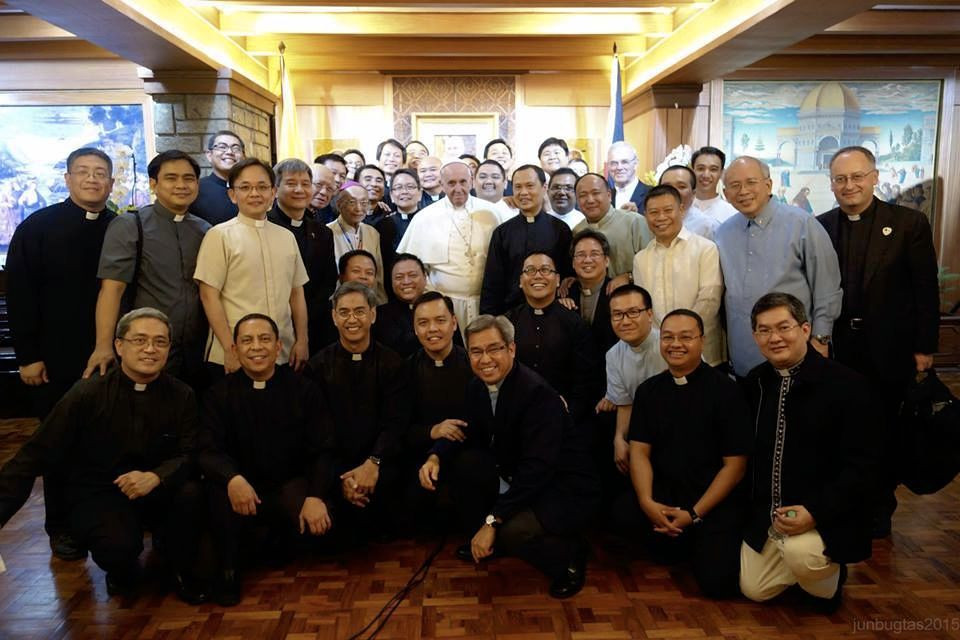Some 40 Jesuits met with Pope Francis at the Nunciature in Manila during his Philippines visit. All were ecstatic at the invitation. I was privileged to be among them.
From the beginning, the meeting was very much that of brother Jesuits coming together. Provincial Tony Moreno SJ opened the meeting saying that Francis had been met by 40 elephants in Sri Lanka and here in Manila he was met by 40 Jesuits. To which Francis replied, “The elephants were more colourfully dressed.”

Some Jesuits asked him if he had a message for the people among whom they minister and for their colleagues. One is serving migrants abroad and those in difficulty on their return home; another with the sick and poor in Philippine General Hospital; another asked for a message for the young adults; another is engaged in promoting vocations to the Society.
Francis spoke with feeling for the sufferings of migrant people. They are on the periphery and our Jesuit mission is to go to the peripheries, to accompany people who live on the edges His message to youth was that they should not fear and that they should not face problems alone. For the sick and suffering in hospital he said in a strong way that they are Christ, that Christ looks at them and sees himself, suffering. This is not some pious idea, this is the truth, he insisted. About vocations, he insisted that no one’s motivation is 100 percent pure when choosing to enter religious life. It is only as we progress that we can step by step purify our desires and our actions. All religious need constantly, daily, to go deeper in prayer, to examine, deepen and refine our motivations, to rid ourselves of distractions.
He emphasised the need for religious, for Jesuits, to be grounded in the life of the people. He appreciates a lot his friendship with Fr General and he likes to talk to him frequently by phone. For him Arrupe was a prophet. He repeated this several times. Fr Arrupe broke the Society out of the stifling controls of the time in which the then Fr General Janssens and his Vicar Fr Swain were caught. But for this Arrupe suffered, even from members of the Society, especially a group in Spain, who claimed he was not rigid enough and wanted a type of “discalced” Society. Yet every initiative taken by Arrupe had the approval of the Holy Father, and it had pained Bergoglio to see how Arrupe would go to the front door of the Curia in order to wave to Holy Father on his return from some parish visit, since he was not granted an audience. Arrupe’s last speech (in Bangkok August 6, 1981) in which he described JRS as his ‘swansong’ touched Francis, because there he held the peripheries (going out to be with the refugees) and prayer in creative tension, not neglecting either.
Pope Francis referred to the affectionate regard that Paul VI had for the Society and quoted in full his words to GC32 in 1974, picked up again and repeated by Benedict XVI in 2008: “Wherever in the Church, even in the most difficult and extreme fields, at the crossroads of ideologies, in the social trenches, there has been and there is confrontation between the burning exigencies of man and the perennial message of the Gospel, here also there have been, and there are, Jesuits”.
He was asked if he enjoyed being Pope, to which he responded that he takes it as a request of the Lord to him, and so he is at peace and remains calm, a happy man. He said that he feels he is really happiest as a parish priest, and this is his approach now, except that his parish is a very big one.
His message to us is clear and consistent: Go to the frontiers; pray constantly about what you experience; attend to the refugees and stand with those who are cast off by society.
Mark Raper SJ
President, Jesuit Conference of Asia Pacific
January 18, 2015








